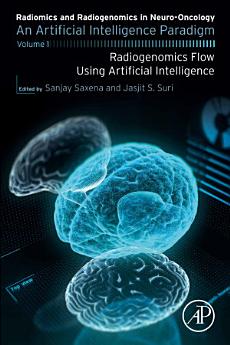Radiomics and Radiogenomics in Neuro-Oncology: An Artificial Intelligence Paradigm - Volume 1: Radiogenomics Flow Using Artificial Intelligence
About this ebook
About the author
Dr. Sanjay Saxena is an Assistant Professor in the Department of Computer Science and Engineering at IIIT Bhubaneswar, India. He obtained his Ph.D. from the Indian Institute of Technology (BHU), Varanasi, and completed his postdoctoral research at the Artificial Intelligence in Biomedical Imaging Lab, University of Pennsylvania, USA. Dr. Saxena's primary research area involves developing AI-based methods for brain cancer analysis, with a broader focus on Data Science, Machine Learning, Deep Learning, and the emerging fields of Radiomics and Radiogenomics. His tenure under Prof. Davatzikos at the University of Pennsylvania was instrumental in his significant learning about Radiomics/Radiogenomics. Dr. Saxena is a member of prestigious organisations such as IEEE, the Society of Neuro-Oncology, ACM, and the New York Academy of Science. He has presented his work at globally recognised universities such as like Imperial College London, Stony Brook University, and Vienna University of Technology. and has made substantial scholarly contributions, with several peer-reviewed Journals, conference publications, book chapters, and two books to his name, advancing the intersection of AI and human cancer research.
Dr. Jasjit Suri, PhD, MBA, is a renowned innovator and scientist. He received the Director General’s Gold Medal in 1980 and is a Fellow of several prestigious organizations, including the American Institute of Medical and Biological Engineering and the Institute of Electrical and Electronics Engineers. Dr. Suri has been honored with lifetime achievement awards from Marcus, NJ, USA, and Graphics Era University, India. He has published nearly 300 peer-reviewed AI articles, 100 books, and holds 100 innovations/trademarks, achieving an H-index of nearly 100 with about 43,000 citations. Dr. Suri has served as chairman of AtheroPoint, IEEE Denver section, and as an advisory board member to various healthcare industries and universities globally.







